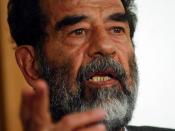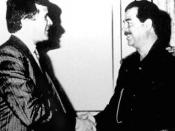The Iraq War has become one of the most controversial and politically heated topics of the decade. It has been the subject of much scrutiny, analysis and examination by everyone from politicians and world leaders to the average, American citizens. The war began on March 20th, 2003 when American, British, Australian and Polish soldiers invaded Southern Iraq from Kuwait on a direct route to Baghdad. Congress had voted on October 2nd, 2002 by a margin of 296-133 to authorize the President to declare war on Iraq if they did not comply with the UN resolution to forfeit all weapons of mass destruction. Hours later, the Senate passed the same resolution by an equally firm majority. [1] President Bush stated that ""Saddam Hussein and his outlaw regime pose a grave threat to the region, the world and the United States. Inaction is not an option, disarmament is a must."[2] The Bush administration cited evidence that despite UN weapons inspections, Iraq was still in possession of a stockpile of biological, chemical and nuclear weapons.
Backers or the war, who were mainly Republican, used the large majority, including amongst Democrats, as evidence that the nation was "behind the war," and that it was mostly agreed upon by the country. Some Senators, however, stated that 133 votes against the war were not insignificant, and should be taken into account before further actions were made. [3]The Bush administration had been backers of a regime change in Iraq from the moment they were elected into office, ending nine years of "containment policy" towards Iraq. [4] This was a policy that had been in place since the end of the First Gulf War in 1991, which focused mainly on financial sanctions, no fly zones and ongoing weapons inspections by the United Nations Security Counsel to maintain control...



A Comprehensive Comparison of the Iraq and Vietnam Wars
The comparison is hardly comprehensive. The whole essay cries out for a good proof-reading to get rid of a frustrating number of rather silly mistakes. Beyond these points, this is a marvelous essay, well researched, well-written, and showing a great deal of skill. WELL DONE!
2 out of 2 people found this comment useful.